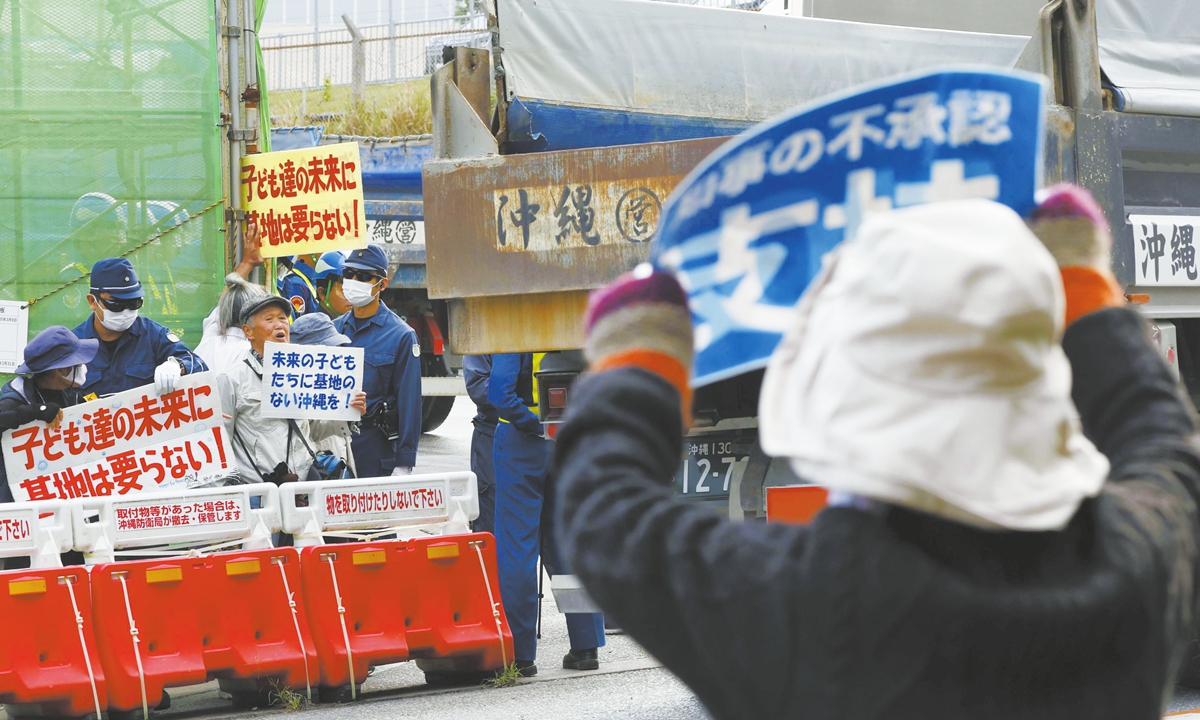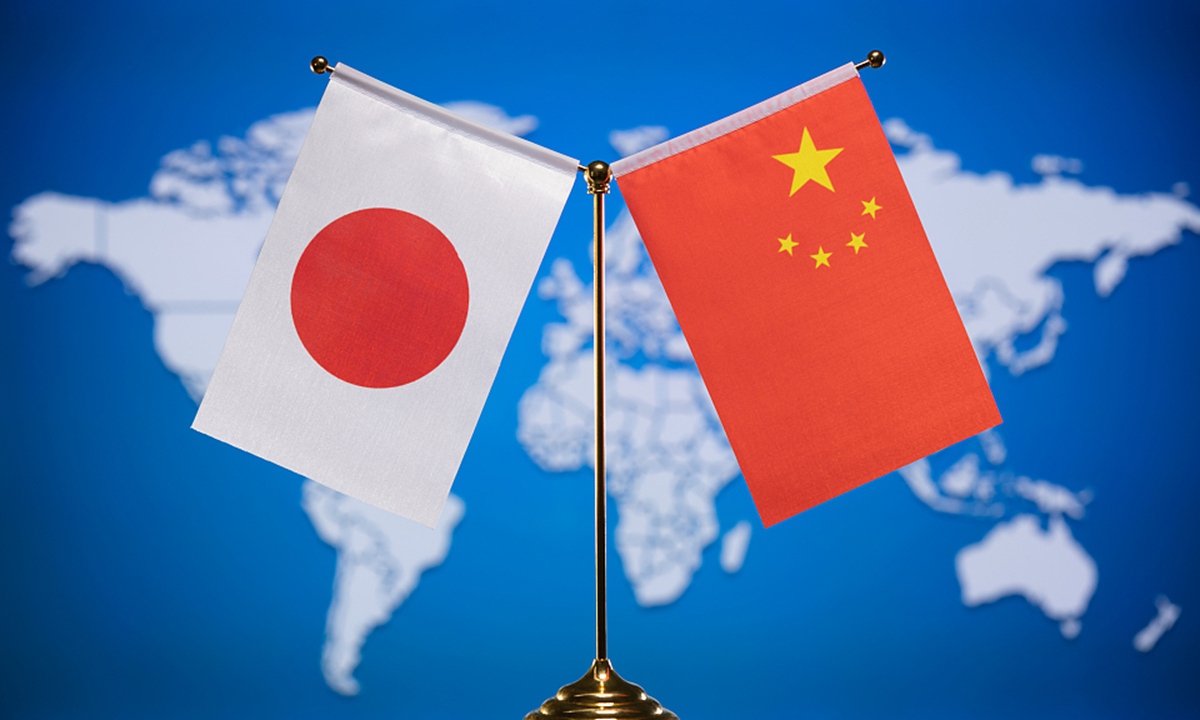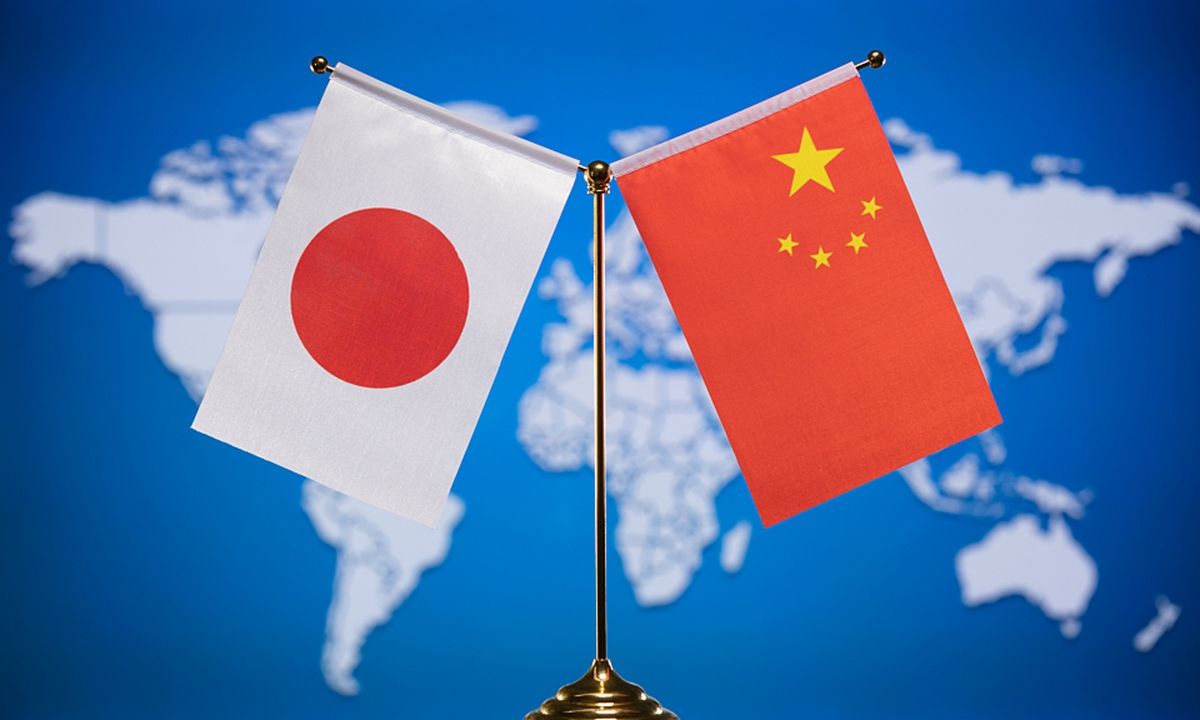Excessively securitized Japan needs ‘de-securitization’ efforts

Japanese people protest in front of the US Marines' Camp Schwab in Nago, Okinawa Prefecture, on January 10, 2024. Photo: VCG
Editor's Note:
Kenji Isezaki (Isezaki), Professor Emeritus at Tokyo University of Foreign Studies, recently ran as a proportional representative candidate for the Reiwa Shinsengumi, one of Japan's opposition parties, in Japan's House of Representatives election. During a street speech, he stated, "China has not initiated any war or invaded any other country in the past 40 years - this is a fact."
In an exclusive interview with Global Times (GT) reporters Xing Xiaojing and Ma Ruiqian, Isezaki elaborated on his remarks, explaining that he used China as an example to question the Japanese government's significant increase in defense spending. He emphasized that Japan and China, as neighboring countries, need to maintain friendly relations.
GT: Why did you try to alleviate some Japanese people's fear about China during your street speech?
Isezaki: At the time, I was questioning the Japanese government's significant increase in military spending, as well as the military fortification of the Ryukyu Islands near the island of Taiwan. The justification of the government was the threat posed by "hostile states."
We also need to consider: Who stands to benefit from stoking public fear? If Japan requires more weapons, obviously, the arms industries in both the US and Japan stand to profit. For politicians, making people fearful is often considered the most effective way to secure votes. I understand that fear is a natural human response. Using fear as a political and economic tool may appear to serve national security in the short term, but it undermines human security in the long term.
That's why I tried to present one aspect of the facts to the Japanese who fear China. Over the past 40 years, China has not initiated any wars involving its army on the ground - not once. That's a fact. In contrast, the US has launched at least 13 wars during the same period. One of these countries was Afghanistan, where I worked during its occupation as a representative of the Japanese government.
My area of expertise is war studies within international relations. There is a theory called "securitization." It describes how some politicians create fear by claiming that there is an "imminent threat" or that "if we don't deal with it now, it will cause irreversible damage," thus leading to the "securitization" of society. This manifests itself in increased military spending, arms build-up and the strengthening of alliances. However, since the enemy's society is also securitized correspondingly, this results in a "security dilemma," where war seems inevitable. This situation benefits no one except those actors and beneficiaries of securitization.
NATO uses the so-called China threat as an excuse to expand its influence. Japan's current administration is also advocating for the creation of an "Asian version of NATO." We are now in a state of heightened securitization, completely caught in the security dilemma. But what is everyday life like for the ordinary people of Japan?
Prices have soared over the past 30 years, yet wages have remained stagnant. Life for the public has become increasingly difficult. Even so, the ruling party continues to advocate for increased military spending, a textbook example of securitization.
What is needed for excessively securitized Japan now is the effort of "de-securitization." For scholars like myself, this means presenting the facts in contentious relations with presumed hypothetical enemies.
GT: You've proposed that the real way to safeguard Japan is to adopt "preventive diplomacy" - diplomatic measures to avoid war. How far is Japan's current security policy from the preventive diplomacy you advocate?
Isezaki: Japan has implemented the so-called preventive diplomacy in the past. Constrained by Article 9 of the Constitution, Japan has, at least so far, refrained from initiating or participating in wars. This could have allowed Japan to actively engage in international disputes through peaceful diplomacy and maintain trustful relations with all potential warring parties.
In my speeches during the election, I repeatedly spoke about the revival of Japan's "preventive diplomacy." For that, it is important to collaborate with China and supplement each other, rather than act independently. While Japan and the US are military allies, the homeland of the US is located across the ocean, while China is our neighbor. It is essential for Japan to maintain close collaborative relations with its neighbors for the betterment of the world and the region. Even in the historical dispute between China and Japan over the Diaoyu Islands, we should explore the path of joint development for the common good of all nations concerned.
GT: You once said, "It's not an exaggeration to say that Japan has now become part of the US." Why do you say so?
Isezaki: The US-Japan Status of Forces Agreement (SOFA), signed in the 1960s, has perpetuated an unusual dynamic between Japan and the US that does not exist with other US allies. Take the case of US military facilities in Japan. The vast airspace spanning most parts of Tokyo and nine neighboring prefectures, the so-called Yokota airspace, is not under Japanese control. The US has full authority over it. This has been the case since World War II.
Without US permission, no Japanese aircraft, including civilian planes and Self-Defense Force aircraft, are allowed to use the airspace. This should not happen in normal diplomatic relations between sovereign states, even in countries that depend solely on the US military for their national defense, such as Afghanistan and Iraq at that time.
Environmental pollution issues at Yokota Air Base were recently revealed by a foreign journalist. However, under the US-Japan SOFA, Japanese authorities have no right to enter US bases to conduct investigations. As a scholar, I made an international comparison of the more than 100 SOFAs that the US operates with more than 100 countries and regions. The study was commercially published as a book and clearly exposed anomalies that exist only in Japan. However, it has yet to be taken up by Japanese politics.
I am sorry and ashamed to say, Japan is not yet a sovereign nation.



